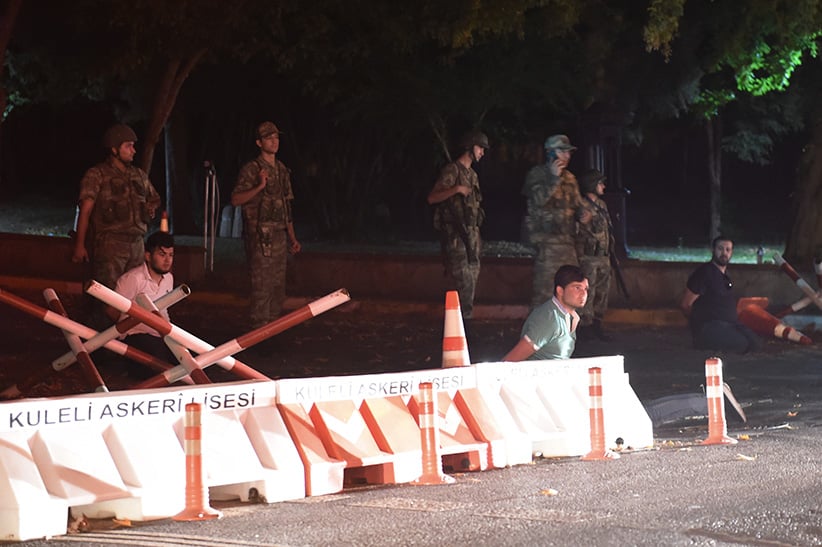Turkey: A political crisis boils over into open rebellion
Adnan R. Khan reports from Istanbul on the attempted coup and what’s behind it
Turkish security officers detain unknown individuals on the side of the road on July 15, 2016 in Istanbul, during a security shutdown of the Bosphorus Bridge. Turkish Prime Minister Binali Yildirim on July 15 denounced what he said was an “illegal attempt” by elements in the military after bridges were partially shut down in Istanbul and jets flew low over Ankara. “We are working on the possibility of an attempt. We will not allow this attempt,” he told NTV television by telephone, without expanding on the nature of the move but saying it was by a group in the Turkish military. (BULENT KILIC/AFP/Getty Images)
Share

Confusion and uncertainty reigned over Turkey on Saturday after simmering tensions inside the Turkish military broke out into an open rebellion. According to local media and the military website, on Friday night elements in the army and air force took control of the military headquarters in Turkey’s capital of Ankara, the national broadcaster and Istanbul’s main airport, the site of an Islamic State attack on June 28. Army vehicles had also blocked both bridges in Istanbul across the Bosphorus Strait and surrounded the iconic Taksim Square in the city centre.
Helicopters circled over the bridge and fighter jets made low passes over the city while gunfire could be heard from Taksim where supporters of Turkish President Recep Tayyip Erdogan heeded their leader’s call to take to the streets to confront the coup plotters.
“We will not leave the ground to them,” the president said in a telephone interview with CNN Turk from his holiday home in Marmaris, a seaside resort on Turkey’s Aegean coast. “I am the chief commander.”
By the early hours of Saturday morning, the coup appeared to be failing but in its final hours it turned more violent. Pro-coup fighter jets began targeting Ataturk airport where Erdogan was scheduled to land in the morning. They hit police stations and municipal buildings around Istanbul. Over the skies of Taksim Square in Istanbul, one pro-coup jet was engaged in a dogfight with two government planes. Bomb blasts were also reported in Ankara, including at least one that targeted the parliament.
Erdogan did arrive at Ataturk airport in Istanbul on Saturday morning and was greeted by large crowds. He later addressed the media, calling the coup attempt an act of treason.
Rumours had been circulating for weeks that a coup was in the works inside the military, which has been fractured by recent purges targeting alleged supporters of the Gulen movement, led by Fethullah Gülen, a moderate Turkish cleric living in exile in the United States. Erdogan specifically fingered the Gulenists during his telephone address, calling them a “minor faction” in the military that would be crushed.
The coup attempt is the latest in a series of political crises to hit Turkey over the past few months. On May 5, Ahmet Davutoglu, a former Erdogan ally, stepped down as prime minister over alleged disagreements in the way refugee negotiations with the European Union were handled.
Davutoglu’s resignation followed a public spat between Bülent Arinç, a founding member of the ruling Justice and Development Party, known by its Turkish acronym AKP, and Erdogan over the president’s undemocratic tendencies and corruption in the government ranks. Other senior members of the party, including former president Abdullah Gül, had also begun to voice their concerns, exposing a festering wound at the heart of the party that Erdogan founded in 2001.
As of early Saturday morning in Turkey, local media reported that some of the coup soldiers had surrendered their weapons to civilians before being arrested by the police.
Ümit Dündar, the first commander of the army, indicated in a public statement that the plotters did not have the support of senior commanders. “There is nothing to be worried about,” he said. “All measures are being taken with the soldiers who remain in the chain of command.”
The fallout from the coup attempt will be significant. Turkish commentators have warned that a failed coup would strengthen Erdogan’s hand and lead to an accelerated shift to a presidential system, further concentrating power in his presidency. A successful coup, which now seems an unlikely outcome, would plummet Turkey into uncertainty at a time when its economy is under strain from a collapsed tourism industry and diminishing foreign investment following a series of terrorist attacks around the country.
Either way, Turks will face a new, and deeply divided country.
This post has been updated to reflect ongoing developments in Turkey.